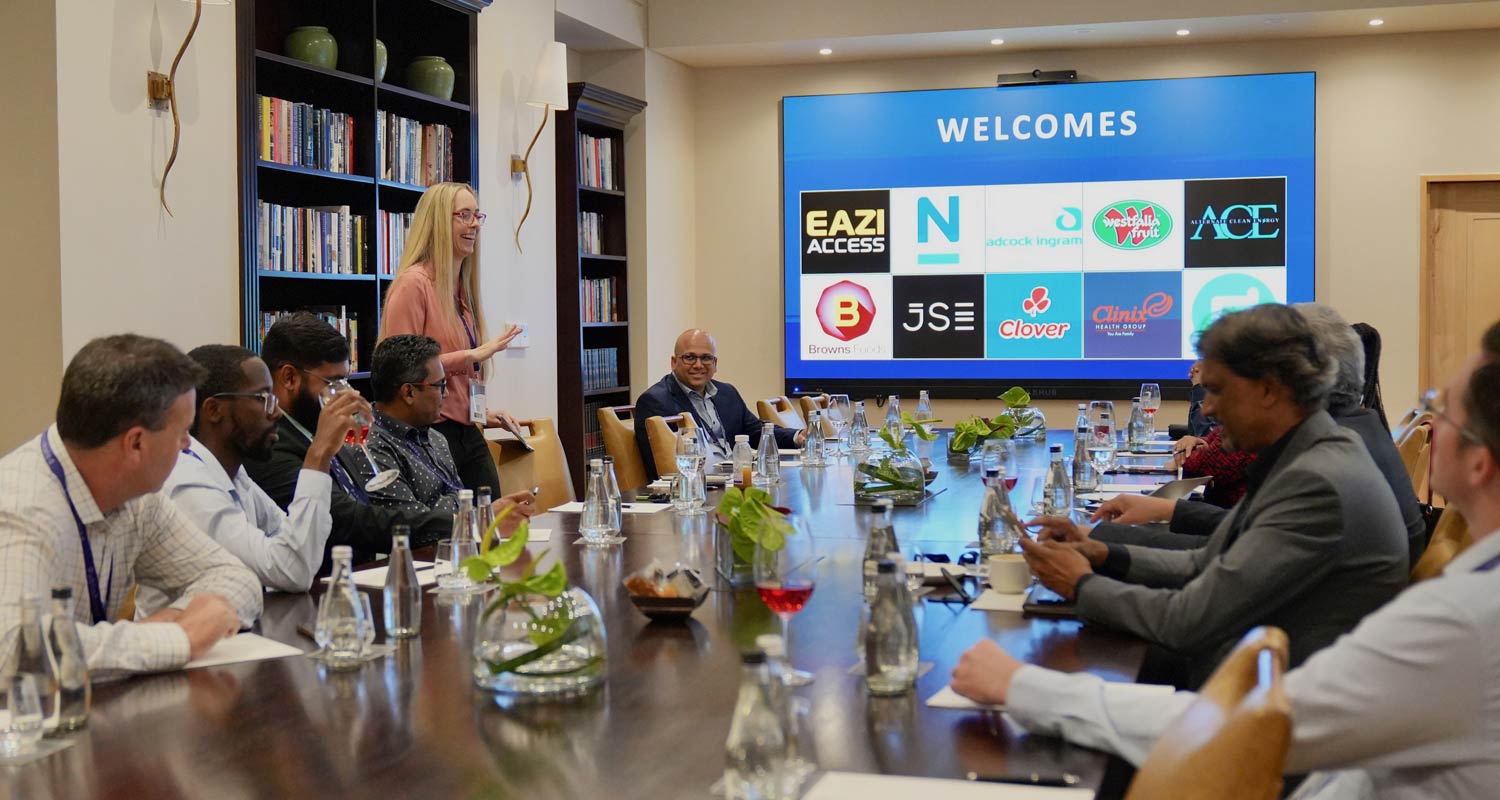 TechCentral and Consnet hosted a series of round-table discussions with leading executives to talk about the most critical client experience trends for 2024, as well as approaches to elevating customer experience through the strategic use of cloud ERP. This is what transpired.
TechCentral and Consnet hosted a series of round-table discussions with leading executives to talk about the most critical client experience trends for 2024, as well as approaches to elevating customer experience through the strategic use of cloud ERP. This is what transpired.
In the words of customer service expert Shep Hyken, “customer experience is not an expense, it’s an investment”.
This perspective underscores a fundamental truth — that investing in the customer journey is not a cost to be minimized but a strategic decision with profound implications for a business’s success.
Customer expectations have undergone a remarkable transformation in recent years, driven by technological advancements, evolving societal values and an increased emphasis on personalised interactions. Today’s consumers are also more informed, connected and discerning than ever before. They demand seamless and tailored experiences across multiple touchpoints, emphasising convenience, immediacy and authenticity.
To discuss the most critical customer experience (CX) trends that will define 2024 and beyond, including the strategic use of cloud enterprise resource planning, TechCentral hosted a series of round-table conversations sponsored by Consnet with some of the country’s leading executives at the Saxon Hotel & Spa in Sandton.
Attendees delved into evolving customer expectations and their role in shaping critical CX priorities, the typical challenges businesses face in delivering customer expectations, the role of technology, including cloud ERP in enhancing customer experience and the future of customer experience.
They all agreed that, looking ahead to 2024, several customer experience trends are poised to dominate. Hyper-personalisation stands out, with customers expecting highly individualised interactions and offerings. The omnichannel approach continues to gain significance, as businesses strive to provide consistent experiences across online and offline channels.
Significant evolution
Sustainability emerges as a key priority, with environmentally conscious consumers favouring brands that align with their values. The integration of emerging technologies such as AIis expected to shape customer experiences by enabling predictive insights and personalised services.
There was consensus among attendees that elevating customer experience is a collective responsibility that extends beyond designated roles, necessitating the active engagement and commitment of all employees throughout the organisation.
Attendees reported that over the past few years, customer expectations have undergone a significant evolution, driven by a confluence of technological, societal and economic factors. The increasing ubiquity of digital technologies has heightened the demand for seamless, personalised experiences across all touchpoints. Social media has given consumers a powerful platform to voice opinions and share experiences, influencing brand expectations.
The rise of e-commerce giants has set new standards for convenience and rapid delivery. A focus on sustainability and ethical business practices has shifted customer priorities. Looking ahead to 2024, these evolving expectations will continue to shape CX trends. Hyper-personalisation, omnichannel integration and the increasing influence of artificial intelligence in predictive analytics and automation will be central to meeting these expectations. An emphasis on sustainability and corporate social responsibility is expected to become even more integral to shaping customer perceptions and loyalty.
 Attendees said their organisations typically grapple with myriad challenges when striving to meet and exceed customer expectations. One common hurdle is the rapid evolution of consumer preferences, which requires companies to stay agile and adapt swiftly to changing trends. Balancing the need for personalisation with the scalability of operations poses another challenge, as customers increasingly expect tailored experiences.
Attendees said their organisations typically grapple with myriad challenges when striving to meet and exceed customer expectations. One common hurdle is the rapid evolution of consumer preferences, which requires companies to stay agile and adapt swiftly to changing trends. Balancing the need for personalisation with the scalability of operations poses another challenge, as customers increasingly expect tailored experiences.
Inconsistent communication across various touchpoints and channels can result in a disjointed customer journey, impacting satisfaction. Integrating emerging technologies, such as AI and omnichannel strategies, while ensuring data privacy and security, remains a complex task. Moreover, businesses often face difficulties in aligning internal processes to deliver a seamless customer experience, with organisational silos hindering cross-functional collaboration.
There was agreement amongst delegates that providing an elevated customer experience requires a profound cultural shift where every facet of the organisation, from leadership down to each employee, is aligned with the collective goal of prioritising and enhancing customer satisfaction. This entails moving beyond the conventional view of customer experience as a departmental responsibility and elevating it to a company-wide commitment.
It demands dedicated resources, strategic clarity and a continuous focus on integrating customer-centric values into every decision-making process. Achieving this transformation necessitates not just a temporary initiative but a sustained effort endorsed by leadership, becoming an inherent part of the organisational DNA. The challenge is to foster an environment where delivering a superior customer experience is not an isolated task, but a shared responsibility ingrained in the daily operations and mindset of everyone in the organisation.
The role of technology, including cloud ERP
Technology solutions offer businesses valuable tools to enhance customer interactions and satisfaction. These solutions, ranging from advanced analytics and artificial intelligence to customer relationship management (CRM) systems, facilitate a deeper understanding of customer behaviours and preferences. Additionally, technologies like augmented reality (AR) and virtual reality (VR) are transforming product experiences, while personalised marketing automation and interactive communication channels create tailored and responsive interactions.
Cloud ERP, in particular, brings a host of benefits to customer experience, contributing to a more streamlined and responsive interaction between businesses and their clientele. The accessibility of real-time data allows for quicker and more informed decision-making, enabling businesses to respond promptly to customer needs and preferences. Cloud ERP systems foster seamless collaboration across departments, ensuring that all customer-facing processes are synchronised.
Moreover, the centralised repository of customer data promotes a holistic view of interactions, enhancing personalised services and improving overall satisfaction. Importantly, the security benefits inherent in reputable cloud ERP solutions play a crucial role in safeguarding sensitive customer information. These systems typically employ advanced encryption, regular security updates and robust access controls, ensuring the confidentiality and integrity of customer data.
 By prioritising security, businesses can build trust with their customers, reassuring them that their information is handled with the utmost care and elevating the overall customer experience.
By prioritising security, businesses can build trust with their customers, reassuring them that their information is handled with the utmost care and elevating the overall customer experience.
There was unanimous agreement amongst attendees that, while technology solutions play a pivotal role in enhancing customer experience, it’s essential to recognise that they are not a one-size-fits-all silver bullet. Achieving a truly elevated customer experience requires a holistic approach that extends beyond implementing cutting-edge tools. The organisational culture plays a crucial role, influencing how employees engage with customers and embody customer-centric values. Incorporating human-centred design principles is paramount; understanding and empathising with customers’ needs and preferences should precede the integration of technology. The synergy between a customer-focused culture, human-centred design, and well-thought-out technology solutions forms the foundation for a transformative customer experience that goes beyond the capabilities of any standalone technological innovation.
The future of CX
Looking ahead, attendees believed that the future of CX lies in the hands of businesses that can adapt, innovate and prioritise customer satisfaction. The critical trends outlined, from hyper-personalisation and omnichannel integration to the growing impact of advanced technologies and a heightened focus on sustainability, collectively signal a future where customer expectations will continue to evolve. The ability of businesses to integrate these trends into their strategies will be paramount in delivering not just satisfactory but exceptional customer experiences.
TechCentral and Consnet thank all of those who participated in the round-table discussion.
- Read more articles by Consnet on TechCentral
- This promoted content was paid for by the party concerned



